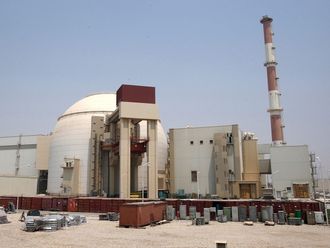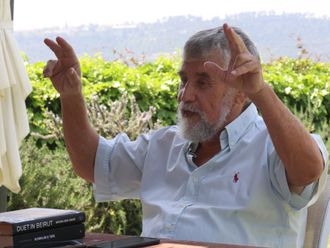Dubai: With increasing signs of a potential American-Iranian direct dialogue, Tehran and Tel Aviv seem to be vying with each other to lay down their own roadmap for the talks.
The Iranian goal is to have an acknowledged say in regional affairs, while Israel aims to stay as the only strategic ally of Washington in the Middle East, analysts and experts say.
An Israeli press report published on Monday detailed Israel's "low-profile" attempt to influence the way the Americans sit at the negotiating table with the Iranians. The report was also highlighted by the Iranian media.
Tehran, on the other hand, sought to downplay the "exaggerated" impact of Israeli positions. While it reiterated its right to develop a "peaceful" nuclear programme, it said the test-run of its Russian-built nuclear power plant in Bushehr would be a "limited" one.
"Iran", said Riyad Qahwaji, director of the Dubai-based Near East and Gulf Centre for Military Analysis (IMEGMA), "seeks to be the strongest country in the Middle East. This is not suitable for Israel, and vice-versa."
"It is not in Israel's interests to see strong relations between Iran and the US and a dialogue according to Iranian conditions. This will be at the expense of the Israeli interests," Qahwaji added in an interview with Gulf News.
Tehran, experts say, seeks to enter a dialogue with the US armed with a nuclear programme, a weighty say and a noticeable presence in the region's issues, such as peace negotiations and even the security situations in Afghanistan and Iraq.
Already Iran considers itself a "super-power" taking into consideration its vast geographic area, population, and abundance of diverse natural resources, including oil and gas.
The Israeli newspaper Haaretz yesterday published a report titled "Israel's new Iran policy: Sway Obama on Tehran talks," which explained Israeli concerns at the likelihood of Iran-US talks.
"Israel regards [US President] Obama's decision to talk to Tehran about its nuclear programme as a done deal. What it is trying to do, in a low-profile way, is to impact the way the Americans reach the point of dialogue," Haaretz wrote.
Moreover, Israel is pinning its hopes on any talks being "relatively short-term, and harbours few illusions about a positive outcome", the paper wrote.
Once the talks fell through, it reasoned, Washington would lead an international effort to impose harsher sanctions.
While Israel would have the Americans subject their talks with Iran to the condition that it would freeze Uranium enrichment, the paper quoted Israeli Defence Minister Ehud Barak as saying "Israel will take no option off the table".
Commander of Israel's Navy, Major General Eliezer Marom, was quoted as saying: "An axis of evil coordinated between Iran, Syria, Hezbollah and Hamas, will require Israel to wage a campaign against it that will require our best efforts and abilities."
An Israeli attack against Iran seems technically "very difficult... but I don't rule any action by Israel," Qahwaji commented.
The Haaretz report did not go unseen in the Iranian media.
"It [report] comes within the framework of pressuring the US administration not to initiate an equal dialogue with Iran," Iranian expert Amir Musawai told Gulf News.
Israel and some "regional parties" are concerned about "equal, serious, balanced dialogue with a fixed agenda," he added.
Musawi reiterated Iranian statements that Tehran has the full right to own its own "peaceful nuclear programme", adding that Iran had suggested guarantees which would ensure the "programme doesn't deviate to military purposes". There seemed to be acceptance of the inevitability of an international organisation or company to oversee all the Iranian nuclear activities.
Iran's recent "provocative" statements against some of its neighbours, mainly Bahrain, have raised concerns and fears about its intentions, analysts said.
Meanwhile, Iran has said its first nuclear power plant will undergo a test run this week in the southern Bushehr province.
The 1,000-megawatt reactor, built with Russian assistance, will be tested in the presence of Iranian and Russian officials, the Iranian official news agency (IRNA) reported.
Both Gholam Reza Aghazadeh, head of Iran's Atomic Energy Organisation, and Sergei Kiriyenko, chief executive officer of Rosatom Corp., Russia's state-owned nuclear holding company, are expected to be present, IRNA said.
"It will be a limited test," Musawi said.
"It is going to be a check-C", he added in reference to tests that would be limited to the interface and computer system.












